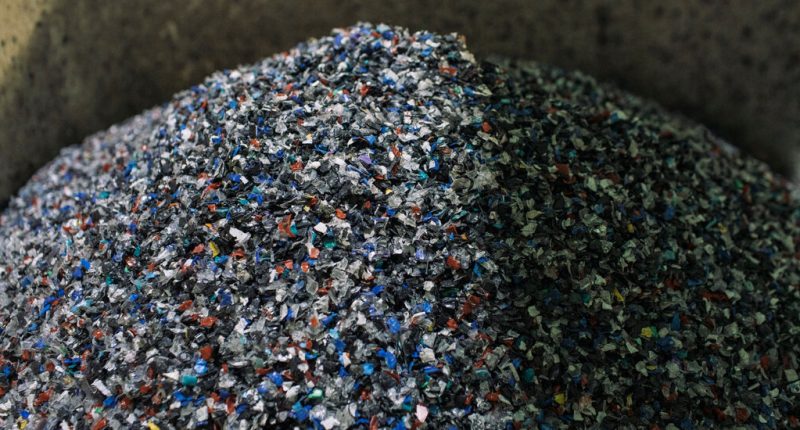Most of the plastic in your medicine cabinet is high-quality, medical grade — and devilishly difficult to safely dispose of, let alone recycle.
The sorting equipment at standard recycling centers typically can’t handle small items, and wishfully including them only prolongs the sorting process that then increases the recyclers’ costs without salvaging the plastic. Some at-home medical products, like needles that have come into contact with bodily fluids, should not even be relegated to household trash.
Governments and big pharmacy chains offer some guidance. For example, New York state’s Department of Environmental Conservation has a map of collection boxes for safely disposing of medications, and Walgreens and CVS Health have safe medication disposal kiosks at select locations. They also sell special containers for shipping used, discarded needles and medical waste to sites for safe disposal.
But when it comes to recycling plastic devices, from asthma inhalers to insulin and allergy pens, people may find themselves ping-ponging around without a solution. Some states recommend inquiring with local pharmacies, which in turn recommend checking with municipal recycling facilities.
“What we really need is an evolving, specialized recycling infrastructure alongside the big five — paper, glass, plastic, metal and cardboard,” said Mitch Ratcliffe, publisher of the website Earth911. “That conversation is really picking up steam in some particular categories, but not in medical equipment at all.”
A few designers and companies are exploring alternatives that are more reusable or safer for the environment.
Inhalers
The inhalers that many people use for treatment of asthma or other respiratory ailments contain potentially recyclable materials. But those with leftover medication or propellants may also be hazardous if incinerated or compacted.
The steel or aluminum canisters containing the medication should generally be returned to a pharmacy that accepts medical waste. The Asthma and Allergy Foundation of America also recommends checking with your local health department because it sometimes has disposal options.
Metered-dose inhalers also use hydrofluorocarbon propellants, which are a potent greenhouse gas. The roughly 144 million metered-dose inhalers Americans used in 2020 released emissions equivalent to six months of driving by a million cars. When medically appropriate, inhalers equipped with dry powder or soft mist are considered greener devices.
Insulin pens and syringes
Insulin pens and auto-injectors for treating allergies typically incorporate multiple types of plastic in their design, and unless you take them apart, you can’t recycle them without blending the materials together into a lower-quality product.
To discard needles used for allergy applications or blood glucose monitoring, the Food and Drug Administration recommends using approved disposal containers. The puncture-proof, opaque plastic of an empty laundry detergent or fabric softener bottle can serve as a substitute. Some people use needle clippers to remove the metal end of their needles before disposal, so that they can put the remaining plastic into the rubbish bin.
Information on local disposal programs can be found on the websites of organizations like Needy Meds and the Pharmaceutical Product Stewardship Work Group. Private waste disposal companies such as Republic Services also offer mail-in programs for a fee.
Prescription pill bottles
Every year, Americans fill billions of prescriptions that often come in translucent orange containers made of polypropylene, a recyclable plastic marked No. 5. But most municipal recycling programs do not accept them because they are so small that they fall through the machinery. And the bottles’ vivid color precludes mixing them with other plastics to yield a clear recycled product.
The international humanitarian aid and disaster relief organization Matthew 25: Ministries invites people to donate empty bottles, scrubbed of identifying information, for reuse.
Covid tests
Since 2020, at-home diagnostic tests for Covid have become commonplace. It’s tempting to try to recycle the plastic they contain. But the samples in used tests can be a vector for infection, so they need to be put in the trash.
Some are trying to redesign the tests to be more eco-friendly. A London-based industrial design firm proposed a biodegradable option, and a lab at the University of Pennsylvania led the development of a test made from an organic compound, bacterial cellulose — but both remain prototypes.
And Cabinet Health, a certified B-Corp company, eliminates single-use plastics by providing medicines in refillable glass bottles and refills in compostable pouches.
Other items
Some companies offer services to collect and recycle certain types of household medical waste that municipal programs won’t accept. TerraCycle offers mail-in and drop-off services for plastic items including eyewear, like old glasses and contact lens containers or blister packs, and oral care packaging, such as toothbrushes and toothpaste tubes. The company then sorts and recycles the material, and works with manufacturers to turn them into new products.
Also Read More: World News | Entertainment News | Celebrity News









